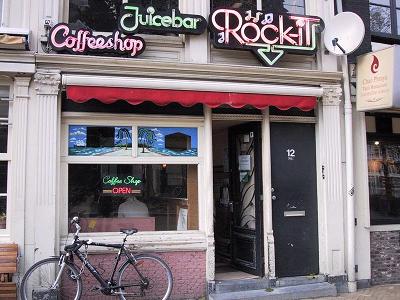
Only a few weeks ago it seemed the Dutch tolerance towards soft drugs would end soon, due to the increasing strength of the puritan movement in Dutch politics. Magic mushrooms are already banned, while the future of the coffeeshop seemed limited, due to cheese paring measures forced on city councils like the rule that no coffeeshop could be located within 500 metres of a school. Try and find a coffeeshop in Amsterdam that doesn’t…
Meanwhile the growing troubles caused by socalled drugs tourists from France, Germany and Belgium in border towns had already led several of those towns to close down their coffee shops altogether. The future therefore seemed bleak for the ordinary cannabis user in the Netherlands, who smokes it recreationally or to relief pains and nausea (for which it works quite well, as I’ve seen myself, better than many conventional pain killers or nausea relievers). Though the system had worked reasonably well for some three decades, making going to the coffee shop almost as normal as going down the local for a quick pint and a half, it had always been a stopgap, an attempt to regulate cannabis trade without legalising it, as that would be difficult to explain abroad. It was introduced as a measure to free police resources for the battle against hard drugs as well as to limit the dangers of cannabis users “graduating” towards harder drugs. As such it worked well, but there never was the intention on the part of the authorities to go any further towards legalisation. It was a policy they were forced into but never were comfortable with.
Tolerance as a policy, even had it had the full support of politicians and police, could never continue forever. The inherent contradictions of the policy, which made it semi-legal to buy and sell cannabis at a retail level, but illegal to sell wholesale, let alone grow it, would see to this. But because we could never make the choice of legalisation without incurring the wrath of France and America, nor end Tolerance altogether the situation did continue. The hobbyists and smalltime growers who had been the base of the cannabis culture in the Netherlands were driven out by organised crime causing huge problems for many city councils.
The way these criminals operate is to go to an impoverished neighbourhood in Rotterdam or Tilburg or someplace simular and get a front man to hire a house from the council or housing society. This is then turned into a full blown industrial cannabis nursery, powered by stolen electricity from the neighbours. They only need to keep the flat on for several months, until harvest time, then disappear and make a huge profit selling their harvest to the coffeeshops. Despite everything the councils do to combat this, there’s little risk for the real criminals themselves: they leave everything to their patsies.
So it’s no wonder that the mayors of some thirty cities, including Amsterdam, last Saturday called for an end to this situation, by regulating the “backdoor of the coffeeshop”. What they want is to legalise the growing of cannabis by putting it under state supervision and allowing coffeeshops to legally buy their supplies from these suppliers. This would end the involvement of organised gangs, regulate the awkward situation the coffeeshops themselves are in now where they’re forced to buy from criminals, not to mention provide amuch needed source of income for local councils. It’s a good idea, but at the moment it still seems unlikely the central government will take the councils on, as the governing parties are largely opposed to legalisation.